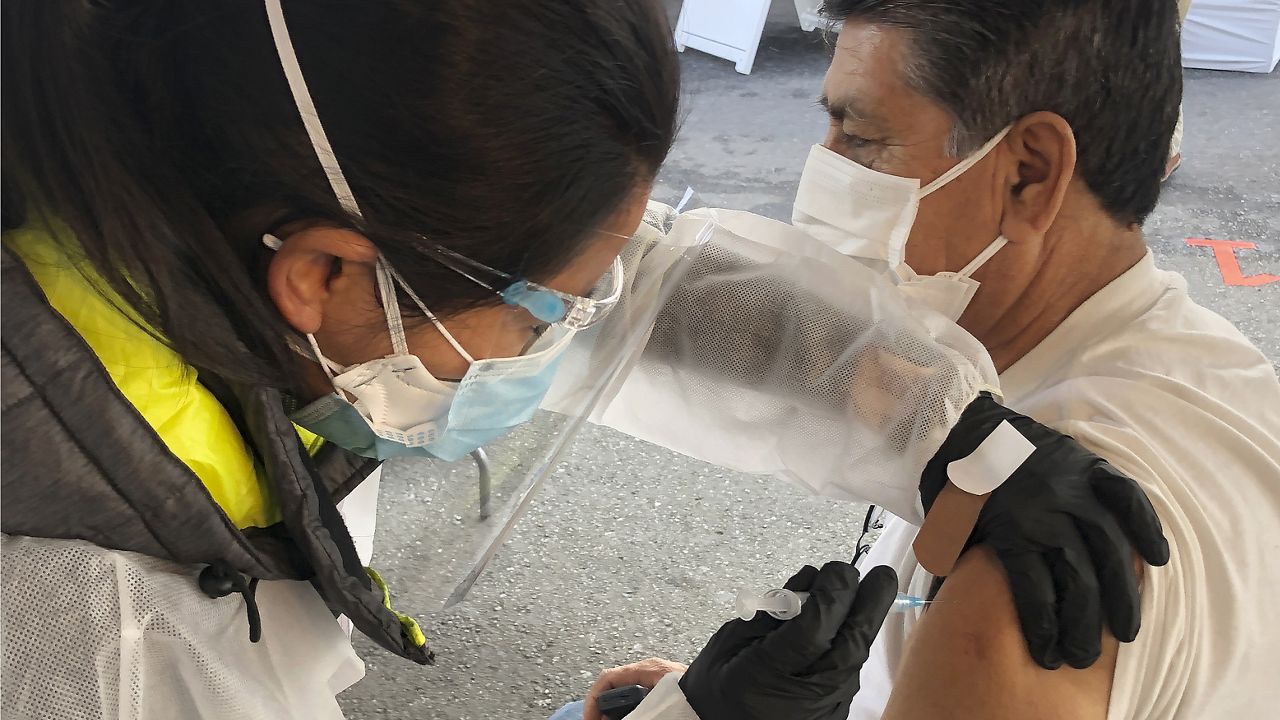There is mounting evidence that people previously infected with COVID-19 may only need one dose of the mRNA vaccines for protection against the coronavirus.
Researchers at Mount Sinai Icahn School of Medicine were among the first to release their findings from a National Institutes of Health (NIH)-supported study, which followed a group of high risk healthcare workers; about a third of them were COVID-19 survivors.
“What we saw was that in people who had COVID, the antibody reaction to the first shot is very, very strong,” Dr. Ania Wajnberg, who is part of the team working on the study, told Spectrum News. “Similar to the second shot in people who have not had COVID.”
Dr. Francis Collins, the Director of the NIH, wrote about the findings in a blog post: “If other studies support these results, the U.S. Food and Drug Administration might decide to consider whether one dose is enough for people who’ve had a prior COVID-19 infection.”
Health officials in France have already updated their guidance to recommend that people who have had COVID-19 should receive one dose of the two-shot vaccines, such as the ones from Moderna, Pfizer-BioNTech, and AstraZeneca.
Dr. Mohammed Sajadi, an associate professor of medicine at the University of Maryland’s Institute of Human Virology, penned a similar study that was published in The Journal of the American Medical Association. “For people who've had COVID before and then get vaccinated, we're actually seeing very high titers [concentration of antibodies in the blood] within a week or so. Even after a couple of days, the body just starts making a lot of antibodies because it remembers seeing the virus before.”
These findings come as new cases of coronavirus are creeping back up, fueled, experts say, by new variants that are increasing in circulation. CDC Director Dr. Rochelle Walensky has said the sooner more Americans get vaccinated, the better.
“The most recent seven-day average [of cases] is nearly 55,000 per day, up about three percent from the prior seven-day average,” Dr. Walensky said during a recent White House COVID-19 briefing. “I continue to be worried about the latest data and the apparent stall we are seeing in the trajectory of the pandemic.”
More and more institutions are releasing their findings: Researchers at UNC Chapel Hill, University College London, the NYU Langone Vaccine Center, and the University of Washington have all conducted similar studies -- and saw similar results.
There’s no difference between the two doses, which means a second dose slotted for an individual who was previously infected could be redirected to someone else for their first or second dose.
“We've had 30 million documented cases here, so potentially it would be the difference of millions of second doses,” said Dr. Wajnberg. “That's why we wanted to get this out there quickly, because this is an urgent and timely decision.”
While the data suggests there is little benefit of a second shot of the mRNA vaccine to those previously infected with COVID-19, more research is still needed.
Each person infected with coronavirus has a different immune response, and Dr. Wajnberg says confirming that a person has antibodies could overcomplicate vaccine distribution efforts.
“We don't know yet what the magical number or level is, of antibodies that will protect us,” she added. “I think science is learning more and more about that every day.”
But what is clear from this research, Dr. Sajadi says, is that nearly everyone who was once infected retains some immune memory of the disease, which may be enough.
“The neutralizing antibody for the people who previously had COVID, after the two weeks, it was five hundred times greater than those who didn't have COVID and got the first dose,” he added. “With those kinds of differences, I mean, yeah, we could test it in 500,000 or whatever more people. I don't think that that part is going to change.”
Determining whether a person is allotted one dose or two of the mRNA vaccines, he noted, could be as simple as asking them whether they were previously infected before the shot is administered.
When asked if U.S. health officials were considering a policy change over mRNA dosing, Dr. Anthony Fauci told Spectrum News that they have seen the data, but are not considering a change in dosing recommendations.
“Obviously, the places that are now looking at that are those that have a true paucity of vaccine doses,” Fauci said during a recent White House COVID-19 briefing. “We are now at a position where we are giving between two and three million doses a day. If there were a dramatic shortage, I think that’s something that you would want to consider, but that’s not something that we’ll be making a policy about soon.”
Officials say the country’s vaccine output has tripled since January; this week, states are receiving a total of 27 million doses.
Still, many states have reported shortages at distribution centers in certain areas. Internationally, hundreds of countries are still scrambling for vaccines. The U.S. has donated four million doses of AstraZeneca to Mexico and Canada, and committed billions of dollars to the global fight against the pandemic.
A spokesperson for the Food and Drug Administration (FDA) said in an emailed response to Spectrum News that the agency is aware of the burgeoning research, but counters the clinical trial data still supports giving two doses of the mRNA vaccine.
“Without appropriate data of a robust nature supporting such changes in vaccine administration, we run a significant risk of placing public health at risk, undermining the historic vaccination efforts to protect the population from COVID-19,” FDA Press Officer Abby Capobianco said in a statement. “That noted, FDA will reevaluate data in this regard on an ongoing basis.”



